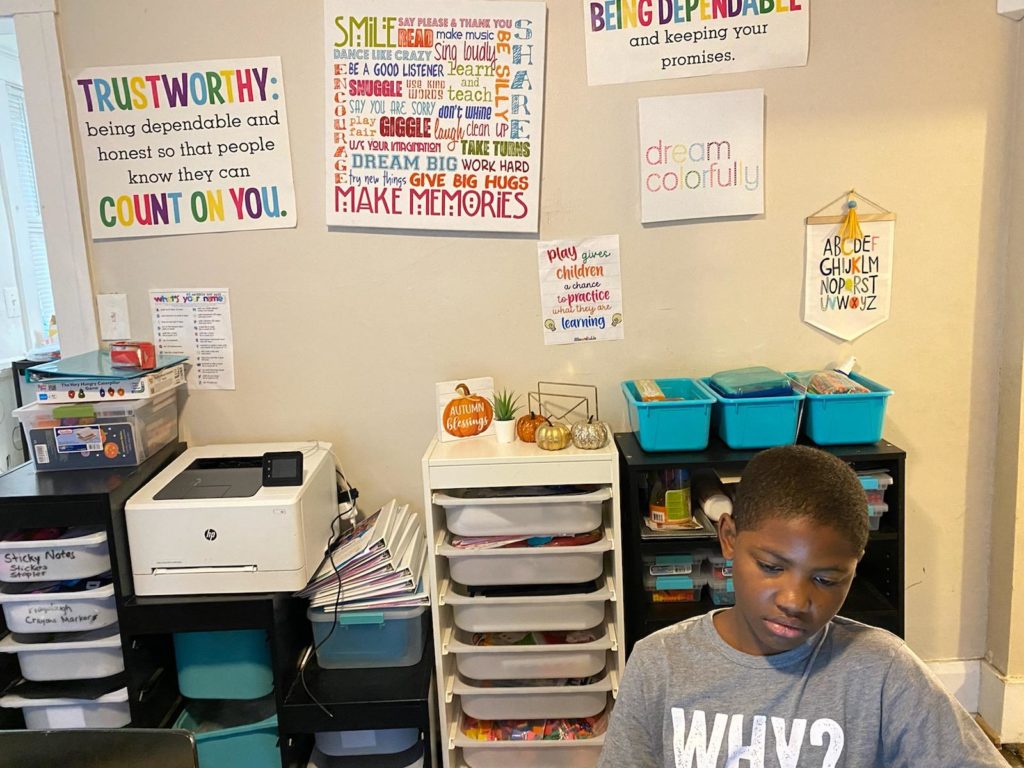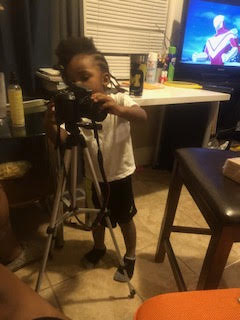Pandemic Learning May Have Made Some Black Parents Homeschool Converts
Pre-pandemic, Black homeschoolers accounted for around 8% of those learning at home. Engaged Detroit is a pilot program dedicated to supporting Black families who are ready to jump into homeschooling.

Stacey Young is a mom of five – three boys, two girls. Trying to manage virtual learning when COVID precautions closed the schools drove her to actual tears. She was stressed. Her kids were stressed.
So she decided to pull back – to stop demanding her kids spend hours in front of the computer – to focus on their emotional needs.
Then the school called.
Young says she asked them if they had services for parents who were working, or for kids dealing with the stress of COVID restrictions, or who have lost loved ones to the virus.
“And the lady took a deep breath and she was like, ‘Ms. Young, is he gonna be able to log on tomorrow?’”
Young withdrew her kids as soon as she hung up.
“I had to get mad enough to make that transition to home school,” Young says.
“Our kids were…being, you know, suspended, expelled, bad behavior — these things. And then you start to ask yourself who can learn in that environment?” — Kija Gray, Homeschool Coach
Engaged Detroit Steps In to Support Families
Young had help with the transition to homeschooling. Engaged Detroit is a pilot program that provides support to 14 Black families ready to jump into homeschooling.
Families form pods and meet weekly to discuss concerns, questions, resources and successes. The organization helps parents access programs in the arts, engineering and entrepreneurism, often for free.
Parents get support from coaches like Kija Gray, who has been homeschooling and guiding homeschoolers for almost 20 years.
Gray says some parents are turning to homeschool right now because the education they’re being offered during the pandemic doesn’t work for them. But, she says, others say they see their children blossoming while learning at home and they don’t plan to send their kids back to school.
The Engaged Detroit parents say they’re blossoming, too. They feel empowered and less stressed.
Linda Pennington started homeschooling her fourth-grader this year. She was laid off during the pandemic and is at home with her kids, including an 18-month-old and a 9-month-old. Between finishing her Master’s degree and working on side hustles, Pennington is busy. Still, she says, homeschooling has been working better for her and her daughter than pre-pandemic school.

The state estimates there were just under 50,000 homeschooled children in Michigan in 2018. Before schools transitioned to virtual learning in the wake of the pandemic, Black homeschoolers accounted for around 8% of those learning at home in national counts.
There are many reasons parents choose homeschooling, ranging from religious to cultural to political to academic. Some parents say traditional school never worked for them, but they were just scared to try homeschooling.
Bernita Bradley’s 17-year-old daughter, Victoria, had been asking to homeschool since fifth-grade. Victoria wanted consistency in teaching and had some bad interactions with other kids. Bradley says she was worried that her child wouldn’t have any social skills if she was homeschooled and she was worried about her own teaching skills. “I felt like… I’m gonna do more damage,” she says.
When Pre-Pandemic Education Problems Persist, Homeschooling Offers A Solution
Despite her initial apprehension, Bradley secured the grant that made the Engaged Detroit pilot possible. She says parents told her they had problems with school communication, support and academics long before the pandemic. She says these problems are common to schools educating Black children.
“We cannot have systems pushing into our homes and telling us that our child is a failure because they didn’t do they didn’t write this paper. Bye-bye to that.” — Kija Gray, Homeschool Coach
“What a lot of parents are seeing right now is the residual side effects of what’s already been going on in schools,” says Bradley. “Literally, even though we’re in a pandemic and people are saying, ‘Oh, be patient with us, it’s gonna take time.’ But we’ve heard that even before the schools closed down. We’ve heard that about testing. We’ve heard that about why our children don’t read on grade level.”
“Particularly for Black parents,” says homeschooling coach Kija Gray. “It was interesting because we found schools were being so much more penal in their approach to dealing with our kids. Our kids were being suspended, expelled.. And then you start to ask yourself: Who can learn in that environment?”
Gray says this COVID environment has its own challenges for parents whatever educational plan they’re following. A lot of her coaching time is focused on mental health strategies.
“We’ll get to the other side of (the pandemic),” says Gray. “But we got to be okay when we get on the other side. So we cannot have systems pushing into our homes and telling us that our child is a failure because they didn’t do they didn’t write this paper. Bye-bye to that.”
One question for parents taking the deep dive into homeschooling while many schools are closed: What’s the plan if and when schools and work return to “normal?”
“Right now, I’m really not sure,” says homeschooler Linda Pennington. “I’m just taking it day by day by day.”
Engaged Detroit’s Bernita Bradley says she would like to see Detroit’s public schools partner with homeschooling parents to offer electives and other supports. Some other districts in the state do that already.
Trusted, accurate, up-to-date
WDET is here to keep you informed on essential information, news and resources related to COVID-19.
This is a stressful, insecure time for many. So it’s more important than ever for you, our listeners and readers, who are able to donate to keep supporting WDET’s mission. Please make a gift today.
